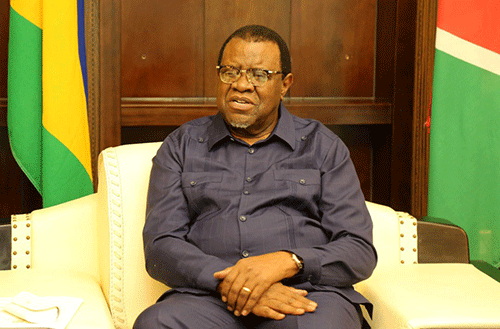President Hage Geingob has once again urged all Namibians to redouble efforts to end violence against women and girls, and to build a safe Namibian house, free of violence and crimes against women and girls.
“We must report all cases of violence against women and girls, regardless of who the perpetrators are,” Geingob said in a message released yesterday ahead of today’s International Day for the Elimination of Violence Against Women and Girls.
He called on all Namibians to take action in line with the global theme, which calls on all to focus on the 16 days of activism against gender-based violence (GBV).
“Let us play our required role in ending violence against women and girls. Let us show support and solidarity for women’s rights by ensuring safer communities for women and girls,” Geingob said.
Violence against women and girls is a violation of their human rights, and it is largely hidden, stigmatised and unrecognised by health and other service providers.
Despite the robust policy and legal framework in Namibia, women and girls are still exposed to violence throughout their lifecycle – whether at home, schools or the communities they live in.
One in three women experiences physical or sexual violence, the majority of which is perpetrated by intimate partners in Namibia.
Last year, 6% of Namibian women reported experiencing violence during pregnancy and 15% who experienced violence never sought help or told anyone about the violence.
Geingob says he is pleased with the holistic, multi-sectoral approach to tackling the root causes of GBV, which is aimed at transforming societal norms to empower women and girls to eliminate all forms of violence against women and girls as vulnerable members of our society.
He said he is confident in the work of the gender ministry in rolling out the National Plan of Action 2019-2023, focusing on putting survivors first and stimulating a culture of care and gender-based violence watch amongst families, communities and institutions that promote early help-seeking to prevent or limit harm will bear fruit in the long run.
Also, he said the recent men’s conference, co-hosted by the ministry, with a focus on dialogue among men to deal with GBV, is a step in the right direction and showcases a coordinated approach to monitoring and evaluation to eliminate violence against women and girls in Namibia.
He said the country’s policy and legal framework, geared toward the fight against violence against women and girls is strong and includes the Combating of Domestic Violence Act 4 of 2003, the Combating of Rape Act 8 of 2000, the Child Care and Protection Act 3 of 2015 and the Married Persons Equality Act No. 1 of 1996.
“These should be consistently implemented and root causes of GBV must be addressed with urgency,” Geingob said.


